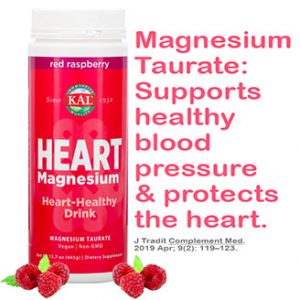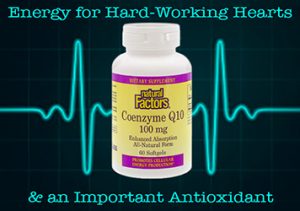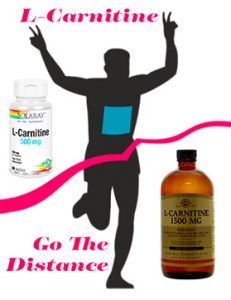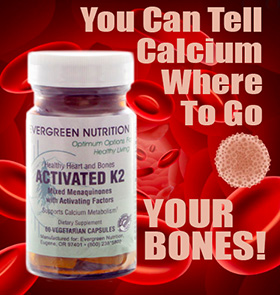Take Heart, Part 1: 4 Supplements for Heart Health
Take Heart, Part 1:
4 Supplements for Heart Health
Heart health is of the utmost importance since cardiovascular disease has long been the leading cause of death in the U.S. and most of the Western world. In the last several decades, nutritional science has accumulated a substantial amount of data supporting the concept that diet is the most important factor in the development and progression of heart disease. In this two-part newsletter we will look at both nutritional supplements for heart health as well as what to avoid with regard to diet and supplements.
Natural Solutions to Support Heart Health
We will begin with several essential substances crucial to the physiological health of the heart:
- Magnesium
- Coenzyme Q10
- L-Carnitine
- Vitamin K2
Magnesium for Heart Function
 As a macro-mineral magnesium is essential for virtually all aspects of human health and it is critical for healthy heart function. It has been shown that individuals who die suddenly of heart attack have far lower magnesium levels than control groups. It helps to dilate the arteries and ease the heart’s pumping of blood. This helps to lower blood pressure and prevent arrhythmias. Magnesium may also prevent calcification of blood vessels (a major risk factor for heart attack), lower total cholesterol, raise HDL cholesterol, and inhibit platelet aggregation.
As a macro-mineral magnesium is essential for virtually all aspects of human health and it is critical for healthy heart function. It has been shown that individuals who die suddenly of heart attack have far lower magnesium levels than control groups. It helps to dilate the arteries and ease the heart’s pumping of blood. This helps to lower blood pressure and prevent arrhythmias. Magnesium may also prevent calcification of blood vessels (a major risk factor for heart attack), lower total cholesterol, raise HDL cholesterol, and inhibit platelet aggregation.
A deficiency of magnesium can cause slow and irregular heartbeat and heart muscle damage. Supplementation of magnesium is highly advised, as soils and drinking water may be depleted. Alcohol, coffee, stress, (fear, anxiety), crowding, and even heavy exercise with its increases in adrenalin flow all decrease magnesium levels in the body. An estimated 60% of menopausal women are magnesium deficient.
Advisable daily dosages are from 350-500 mg. Powders are quite popular right now, and there are liquids, tablets and capsules as well. Look for an amino acid chelate offering superior absorption, such as magnesium glycinate. Evergreen Nutrition’s label offers a vegan capsule providing 400 mg in three capsules. We even have a topical magnesium that is great for muscle cramps.
CoQ10 for Cardiovascular Health
 Coenzyme Q10 has been clinically studied worldwide for decades with relation to cardiovascular function and health. This fat-soluble quinone is an essential component of mitochondrial membranes and plays a direct role in energy production in the cell. Since the heart never rests from its workload, this organ requires a huge amount of energy/fuel/support. The highest levels of CoQ10 in the body are found in the heart muscle for this reason, and it has been shown that deficiencies of this nutrient are common in cardiac patients. Myocardial (heart muscle) biopsies in patients with various cardiac diseases showed deficiency in 50-75% of cases.
Coenzyme Q10 has been clinically studied worldwide for decades with relation to cardiovascular function and health. This fat-soluble quinone is an essential component of mitochondrial membranes and plays a direct role in energy production in the cell. Since the heart never rests from its workload, this organ requires a huge amount of energy/fuel/support. The highest levels of CoQ10 in the body are found in the heart muscle for this reason, and it has been shown that deficiencies of this nutrient are common in cardiac patients. Myocardial (heart muscle) biopsies in patients with various cardiac diseases showed deficiency in 50-75% of cases.
There have been more than 100 clinical studies at major universities and hospitals documenting the cardiovascular benefits of CoQ10. It essentially improves the heart’s ability to pump more effectively. It has demonstrated ability to improve congestive heart failure, cardiomyopathy and angina and to reduce high blood pressure.
Research shows that CoQ10 also offsets the toxic side-effects of statin drugs used for cholesterol control, since these drugs inhibit CoQ10 synthesis in the body and thus potentially damage the heart. Part of this nutrient’s effects also come from its function as a powerful antioxidant, and there are many applications for conditions other than cardiovascular protection.
Supplementation is remarkably safe and dosages vary from 30-200 mg or more depending upon condition. It is advisable to find a product which is in a softgel containing an oil base as this is a fat-soluble nutrient and absorption will be enhanced.
 L-Carnitine Improves Heart Muscle Function
L-Carnitine Improves Heart Muscle Function
The amino acid L-carnitine is vital to heart healthin several ways. It clears fatty acids (triglycerides) out of the blood into the mitochondria to be broken down and used as fuel. Fatty acids are the major source of fuel for the heart muscle’s cells. The heart muscle is particularly prone to L-carnitine deficiency. It has been shown that heart muscle levels of this nutrient are decreased in the following conditions: angina pectoris (chest pain due to lack of oxygen to the heart), myocardial infarction (heart attack), and chronic coronary insufficiency (weak heart muscle resulting in lack of oxygen to the body causing multiple debilitating symptoms).
L-carnitine’s functions include: increasing cardiac output, improving heart muscle function, stimulating energy supply to the heart, regulating heart arrhythmias, and enhancing cardiac performance as well as endurance. Endurance athletes will find it of great use when taken before activity. Its ability to burn fat as energy before preferred glucose may assist in weight loss while benefiting the heart muscle. This is one of the healthiest pre-workout/weight loss aids available as it is not a stimulant.
L-carnitine supplements come in liquid form as well as vegetarian capsules. For athletic use, a dosage of three grams on an empty stomach is recommended.
Vitamin K2 Benefits Blood Vessels
 Vitamin K2 has garnered a lot of interest recently for its role in bone health. The mechanism by which it benefits bone health is essentially involved with its ability to support cardiovascular health. Vitamin K2 activates a special protein called matrix Gla protein (MGP) which prevents calcium from depositing on blood vessels and other soft tissues. Plaque in arteries is largely hardened calcium deposits (calcification process). Research shows that K2 is the strongest inhibitor of tissue calcification yet known.
Vitamin K2 has garnered a lot of interest recently for its role in bone health. The mechanism by which it benefits bone health is essentially involved with its ability to support cardiovascular health. Vitamin K2 activates a special protein called matrix Gla protein (MGP) which prevents calcium from depositing on blood vessels and other soft tissues. Plaque in arteries is largely hardened calcium deposits (calcification process). Research shows that K2 is the strongest inhibitor of tissue calcification yet known.
The Rotterdam Study followed 4,600 men aged 55 and older in the Netherlands. Men with the highest intake of K2 had 52% lower risk of severe aortic calcification, a 41% lower risk of coronary artery disease (heart disease), a 51% lower risk of dying of coronary artery disease and a 26% lower risk of total mortality. Researchers determined that an adequate intake of K2 reduces both coronary calcification and the risk of coronary heart disease. Studies show that adding menaquinone (K2) to the diet will activate MGP to reduce arterial calcium content by 50% over a six-week period. When the calcium is removed from the arteries and soft tissues, it is then directed into the bones where it does the body good.
Food sources of vitamin K2 are grass-fed dairy and the fermented soy product, natto. Supplements are recommended as a conversion in the body from adequate vitamin K1, found in leafy green vegetables such as spinach, kale and collards, is not reliable. Look for the long-acting MK-7 form, such as Jarrow’s MK-7, a gluten free, non-GMO softgel. Our own Evergreen line offers Activated K2, gluten free in a vegan capsule.
Stay tuned for Part 2 of Take Heart: 4 Supplements for Heart Health.
Back to Blog